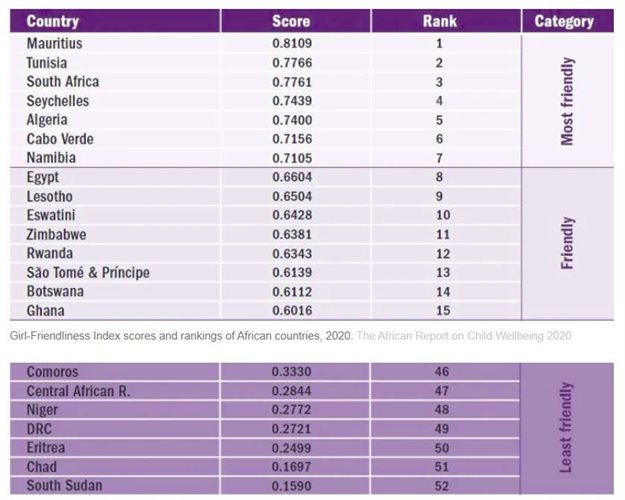Continental report ranks how friendly African governments are towards girls

Not only do governments have legal obligations to protect the life and well-being of girls, doing so also has economic benefits. For instance, it’s argued that every dollar invested in a girl’s education, healthcare and nutrition accumulates into multiple benefits for the society at large.
Failure to invest in girls has socioeconomic impacts on multiple generations. It also increases the number of girls growing up in poverty.
A new, comprehensive flagship report shows how friendly African governments are towards girls, and the extent to which they meet their legal obligations. The African Report on Child Wellbeing (2020), launched by the African Child Policy Forum, analyses the status of girls on the continent using the Girl-Friendly Index.
The report builds on previous work aimed at fostering state accountability towards children, and girls in particular. Importantly, the views of girls are prominent – as they share concerns, fears, wishes and legal demands.
As underscored in the Getting Girls Equal report, a detailed report that evaluates the status of girls and the law in Africa, many girls are at risk of sexual exploitation, harmful cultural practices such as female genital mutilation and child marriage, and dropping out of school.
Girls are exposed to extreme violence and abductions. For instance, abductions of girls and attacks on schools in Cameroon, Chad, Democratic Republic of Congo, Burkina Faso, Mali and Nigeria have led to school closures.
As shown in the African Report on Child Wellbeing, girls occupy a unique, vulnerable position in African society. Social norms, practices and attitudes are prejudicial to the life, survival and development of girls.
This has to change.
African governments must adopt laws, policies and other measures to protect girls from the risks they face by virtue of their age and gender. Girl-friendly governance respects, protects and fulfils girls’ rights and ensures gender equality among children. This is done through laws, policies and allocation of resources to ensure positive outcomes for girls.
The Girl-Friendliness Index
The Girl-Friendliness Index, as provided for in the report, is a rights-based statistical tool and conceptual framework anchored on three pillars of children’s rights: protection, provision and participation. Overall, the countries that score highest as friendly towards girls are Mauritius, Tunisia, South Africa, Seychelles, Algeria, Cabo Verde and Namibia.

The index details how the laws and policies in African states protect the rights and interests of girls. The protection dimension is about the legal, policy and programmatic frameworks that African governments have in place, or should adopt, to safeguard the rights and interests of girls.
For example, governments should criminalise the abuse, exploitation and trafficking of girls. Generally, African countries have made considerable progress in doing so. But there are still huge gaps. If their rights are violated, girls also need to be able to get access to justice and seek remedies. Rwanda, Togo, Namibia, South Africa and Mauritius ranked high for providing solid legal and policy frameworks and institutional enforcement mechanisms.
Protecting the interests and rights of girls demands that governments commit budgets to ensure access to education, sanitation, sexual and reproductive health, and other services critical for their development. This is where the provision pillar comes in. The report found that girls in many African states do not have access to adequate healthcare including sexual and reproductive health services, they lack access to nutritious food, education and other basic services.
In terms of spending on girl’s education, the report found that, Eswatini, Tunisia, Lesotho and Mozambique, performed comparatively high in line with each country’s budget allocation. While these countries may be classified as poor, there’s a commendable trend in spending towards girl’s education.
Tunisia scored high in the provision index as one of the top investors in social protection programmes, education and health services for the benefit of girls.
The participation of girls is a fundamental right and a core principle of children’s rights law. Thus, girls must be allowed to participate in governance – particularly in the formulation of laws, policies and programmes that affect them. However, the participation of girls is qualified; it’s in line with the evolving capacities (age and maturity) of the child concerned.
Governments must create effective, safe and inclusive forms of participation for girls. Creating opportunities for girls to express their views, as the report suggests, empowers them to speak out, enhances their protection, increases programme quality and effectiveness, and contributes to increased state accountability.
What needs to be done
African governments are expected to harmonise their laws and policies in line with international and regional legal norms, frameworks and standards; thus, providing justiciable grounds to enforce the rights of girls.
Governments must also, among other things, initiate programmes that build on the skills and capacities of girls to participate in governance of their communities. This will address social and cultural barriers that prevent girls from participating in matters concerning them.
Progress made by African states towards girl-friendliness is commendable, yet uneven. Thus, it’s crucial for policymakers at all levels to consider the lessons that could be learnt from countries that scored high as the most friendly towards girls, and aim towards adopting best practices for the benefit of girls across Africa.
This article is republished from The Conversation under a Creative Commons license. Read the original article.![]()
Source: The Conversation Africa

The Conversation Africa is an independent source of news and views from the academic and research community. Its aim is to promote better understanding of current affairs and complex issues, and allow for a better quality of public discourse and conversation.
Go to: https://theconversation.com/africa







